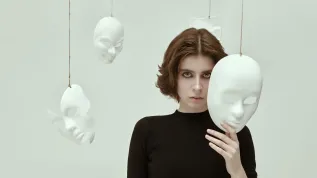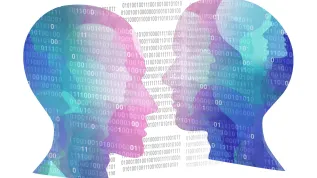
Altruism is often perceived as an impractical attitude that rarely brings tangible benefits. Meanwhile, computer simulations suggest that it may be a mechanism of human survival, the Cracow University of Technology reports.
Jakub Chmiel, a sophomore student of mathematics at the university and member of its Student Science Club of Mathematicians, has found mathematical proof that altruism can be perceived as a mechanism for the survival of the human species. The key to his considerations was game theory in mathematics and the related prisoner's dilemma.
The prisoner's dilemma is a well-known problem in game theory, based on a simple assumption: each player can gain by betraying the opponent, but both will lose if they betray each other at the same time. It is illustrated as follows: in a certain game show, two people are given a prize to share. Each of them can choose to betray or cooperate, but they cannot communicate with each other. They have to predict what the other person will do. If both choose to cooperate, each will receive 3,000 euros. If both choose to betray, each will receive 1,000 euros. However, if one person betrays and the other wants to cooperate, the one who chose betrayal will win 5,000 euros, and the betrayed will receive nothing, as they 'naively' wanted to cooperate.
Since in game theory the player makes rational decisions that are always as beneficial as possible, in this case it theoretically always pays off to betray the other person, because such behaviour brings the greatest profits.
According to the Cracow University of Technology, the prisoner's dilemma is not just a theoretical consideration - we deal with it in real life. An example of this is a situation when two countries are in an arms race and are wondering whether to disarm or continue to arm. This game also occurs in various fields of science, e.g. economics, political science and sociology.
The first scientist who decided to explore the secrets of altruism using mathematics and game theory was Robert Axelrod - an American political scientist from the University of Michigan. Now, years later, Jakub Chmiel has become interested in his research. Based on it, he wrote a computer program that replicates the prisoner's dilemma between broad populations of individuals playing different strategies.
Examples of strategies (phenotypes) used in solving it are as follows:
• betrayer (always betrays);
• sucker (always cooperates);
• random (makes random decisions);
• offended (cooperates until the opponent betrays him for the first time; then he is offended once and for all)
• tit for tat (starts by cooperating, then copies the opponent's previous move);
• forgiving (plays like the 'tit for tat' variant, but forgives in one out of ten cases, even if the opponent continues to betray him);
• suspicious (cooperates if the opponent has cooperated in at least 50 percent of cases so far);
• dunce (starts by betraying, then makes the opposite move to the opponent's last move);
• tomcat (starts off cooperating, but if someone cooperates three times in a row or doesn't cooperate twice in a row, they betray);
• sly (betrays two out of three times);
• warrior (betrays two out of five times).
The finished program checks what happens to a random population playing a repeated prisoner's dilemma over many generations, adding an element promoting the strategy of those individuals who did better than others.
After running many simulations, Jakub Chmiel noticed that the population usually becomes dominated at some point by individuals distinguished by specific traits: initially they are nice and start off cooperating, they are not jealous (in a single interaction, opponents always win as much or more than themselves), they are honest (they are not the first to betray), they react to the betrayal of an opponent, and sometimes they simply forgive.
'These traits are very similar to altruism, the ability to do good to others at the expense of one's own good, which may suggest why altruism occurs in nature. After all, it is no wonder that if mathematical simulations show us the best strategy to play in a situation of betrayal or cooperation, then in the end this best strategy emerges in nature', says Chmiel.
The program additionally self-updates in terms of preferences of those phenotypes that had the best results in subsequent generations of a given population. Thanks to this, it can be seen that in the majority of cases, the individuals characterized by the above traits win the game, and in each subsequent generation their number increases until they completely dominate.
According to Chmiel, mathematics shows us that in order to gain the most from the world around us, we have to behave like a winning phenotype, i.e. be nice, not jealous, honest, but at the same time not let ourselves be used, and sometimes forgive. 'You just have to be a good person', Chmiel says.
His program also shows that even in a situation where the population starts from a position of predominant distrust, and therefore frequent mutual betrayals, in the process of evolution mutations appear that change the players' point of view. Despite the wrongs suffered as a result of treacherous behaviour, they start to more often forgive.
'Single-handedly, such an individual could do little, but several such individuals could form groups and, for example, produce more goods than competing groups that fought each other and betrayed each other. When the representation of +forgiving+ people in the population reached a certain level, society could develop in leaps. Natural selection favoured the genes of such people. After many years, we observe that the result of evolution is altruistic behaviour', Chmiel says.
Dr. Kamil Kular from the Department of Applied Mathematics at the Cracow University of Technology, one of the supervisors of the Student Science Club of Mathematicians, says that the project carried out by Chmiel is entirely original, based on meticulous statistical calculations. 'Of course, statistics is not always an exact reflection of reality, but it is the best approximation we have. In this case, the numbers confirm the research hypotheses regarding altruism', he says. (PAP)
Katarzyna Czechowicz
kap/ bar/
tr. RL













